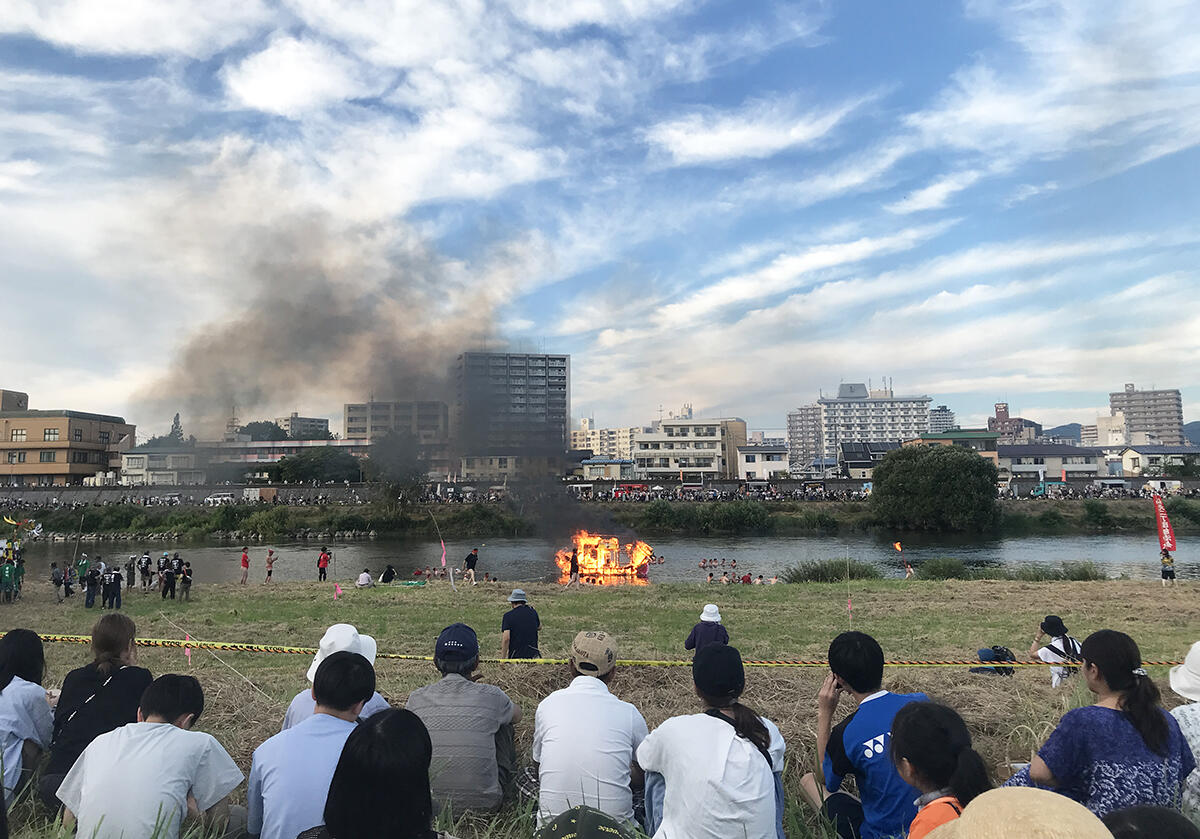お知らせ
- HOME
- ニュース&イベント一覧
- 【国際交流PRアソシエイトからの発信★】Morioka Funekko-naga...
【国際交流PRアソシエイトからの発信★】Morioka Funekko-nagashi Festival (盛岡舟っこ流し)
留学生のRittさんが、盛岡の「舟っこ流し」について素敵な記事を書いてくれました。
Rittさんの記事には、いつもながら、日本の風景や文化の魅力が丁寧に描かれていて、私たちが当たり前すぎて忘れてしまっていたことや、見落としていたことに気づかせてくれます。
今回も、そんなRittさんならではの視点が光る、心温まる内容です。ぜひご一読ください。
Ritt, an international student, has written a wonderful article about the "Funekko Nagashi" festival in Morioka.
As always, Ritt beautifully captures the charm of Japanese landscapes and culture, reminding us of things we've taken for granted or overlooked.
This latest piece is another heartwarming article that showcases Ritt's unique perspective. We hope you enjoy reading it.
Morioka Funekko-nagashi Festival (盛岡舟っこ流し)
After the summer holidays, the beginning of August in Japan, known as Obon, is a time dedicated to honoring the spirits of our ancestors. For many, it's a time of reflection, family gatherings, and spiritual connection. But for me, it became a profound learning experience that opened my eyes to the depth and beauty of Japanese culture.
Obon in Morioka is a fascinating blend of Buddhist beliefs and centuries-old traditions. Families clean the graves of their loved ones, light bonfires, share traditional dishes, and dance the Bon Odori. It's a joyful and deeply reverent time, welcoming the spirits of ancestors who are believed to return to the human world for a short visit. On the final day of the festival, Morioka holds a special event called the Funekko-Nagashi Festival.
When I first visited Morioka, I happened to attend this festival by chance. The feeling I had that day was completely different from what I felt after spending some time here. At first glance, the festival may appear to be a simple ritual involving the burning of wooden boats on a river. But the more I learned, the more I appreciated its meaning. The Funekko-Nagashi Festival is far more than a visual spectacle. It serves as a heartfelt farewell to the spirits of ancestors, held during the final days of Obon. The tradition, conceived as a Buddhist memorial, is said to have originated in the late 17th century with Princess Makukohime of the Nambu Domain. She began the practice of decorating mortuary tablets, placing them in small boats, and floating them down the river as prayers for the deceased.
Centuries later, this tradition continues in Morioka as part of the Okuri-bon, or "Sending-Off Festival." The boats are beautifully decorated by local groups, including dedicated students from Morioka's high schools. As they float down the Kitakami River, they carry prayers for ancestors, for those lost in war, for a bountiful harvest, and for the health and prosperity of the community.
The evening ceremony was led by Abbot Daishin Yoshida of Gida-ji Temple, along with representatives from five other temples. The event concluded with floating lanterns, the tossing of pine torches, and a spectacular fireworks display. It was both a solemn farewell and a beautiful celebration of life.
What impressed me most was the strong sense of community and deep respect for tradition. This was not merely a performance--it was a living ritual rooted in love, memory, and spiritual connection. I was genuinely moved to tears.
As a student at Iwate University, experiencing this festival firsthand gave me more than just cultural insight--it broadened my understanding of how different cultures honor their ancestors. Every country has its own unique way of remembering those who came before us, but witnessing Japan's gentle blend of ritual, nature, and art left a lasting impression on me.
Participating in the Funekko-Nagashi ceremony was one of the most meaningful moments of my time in Japan. It reminded me that traditions are not just rituals--they are living stories, passed down through generations, shaping the spirit of the past and continuing to guide us in the present.
--
เทศกาลฟุเน็กโกะ-นากาชิ
หลังผ่านวันหยุดฤดูร้อน ในช่วงต้นเดือนสิงหาคมที่ญี่ปุ่นกัน หรือที่รู้จักกันในชื่อโอบ้ง ซึ่งเป็นช่วงเวลาที่อุทิศให้กับการรำลึกถึงดวงวิญญาณบรรพบุรุษ สำหรับหลายๆ คน นี่คือช่วงเวลาแห่งการไตร่ตรอง การพบปะสังสรรค์ในครอบครัว และการเชื่อมโยงทางจิตวิญญาณ แต่ช่วงเวลานี้ ก็ได้กลายเป็นประสบการณ์การเรียนรู้อันลึกซึ้งที่เปิดโลกทัศน์ให้ได้สัมผัสถึงความลึกซึ้งและความงดงามของวัฒนธรรมญี่ปุ่นด้วยเช่นกัน
เทศกาลโอบ้งเป็นการผสมผสานระหว่างความเชื่อทางพุทธศาสนาและประเพณีเก่าแก่หลายศตวรรษ แต่ละครอบครัวต่าง กลับมาทำความสะอาดหลุมศพของบุคคลที่ตนรัก ทำอาหารแบบดั้งเดิมรับประทานร่วมกัน และมีการเต้นรำบงโอโดริขึ้น เป็นช่วงเวลาแห่งความสุขและมีการแสดงความเคารพ ต้อนรับดวงวิญญาณบรรพบุรุษที่เชื่อกันว่าจะกลับมาเยี่ยมเยียนโลกมนุษย์เพียงระยะสั้นๆ ในวันสุดท้ายของเทศกาล ที่โมริโอกะได้จัดงานพิเศษที่เรียกว่า เทศกาลฟุเน็กโกะ-นากาชิขึ้น
ช่วงแรกที่อยู่ที่โมริโอกะนั้น ได้มีโอกาสไปร่วมงานเทศกาลนี้โดยบังเอิญ ความรู้สึกในวันนั้นกับความรู้สึกหลังอยู่ที่โมริโอกะไปสักพักนั้นแตกต่างกันอย่างสิ้นเชิง หลังจากที่ได้เรียนรู้และสัมผัสถึงเหตุผลเบื้องหลังของเทศกาล
เมื่อมองเผินๆ เทศกาลนี้อาจดูเหมือนพิธีกรรมง่ายๆ ที่เกี่ยวข้องกับการเผาเรือไม้ในแม่น้ำ แต่ยิ่งเรียนรู้มากเท่าไหร่ ก็ยิ่งเข้าใจความหมายของงานมากขึ้นเทศกาลฟุเน็กโกะ-นากาชิเป็นมากกว่าแค่งานแสดง มันเป็นการแสดงการอำลาวิญญาณบรรพบุรุษ ซึ่งจัดขึ้นในช่วงสุดท้ายของเทศกาลโอบ้ง ประเพณีนี้ซึ่งถือเป็นพิธีกรรมทางพุทธศาสนา กล่าวกันว่ามีต้นกำเนิดในช่วงปลายศตวรรษที่ 17 โดยเจ้าหญิงมาคุโกะฮิเมะแห่งแคว้นนัมบุ พระองค์เริ่มปฏิบัติธรรมในการตกแต่งแผ่นจารึกศพ โดยวางไว้ในเรือลำเล็ก และลอยไปตามแม่น้ำเพื่อสวดมนต์ให้กับผู้ล่วงลับ
หลายศตวรรษต่อมา ประเพณีนี้ยังคงดำเนินต่อไปในเมืองโมริโอกะ ซึ่งเป็นส่วนหนึ่งของเทศกาลโอคุริบง หรือ "เทศกาลส่งตัว" โดยเรือได้รับการตกแต่งอย่างสวยงามโดยกลุ่มคนท้องถิ่น รวมถึงนักเรียนที่ทุ่มเทแรงกายแรงใจจากโรงเรียนมัธยมปลายในเมืองโมริโอกะ ขณะที่พวกเขาล่องไปตามแม่น้ำคิตาคามิ พวกเขาอธิษฐานขอพรบรรพบุรุษ ผู้ที่เสียชีวิตในสงคราม เพื่อผลผลิตที่อุดมสมบูรณ์ และเพื่อสุขภาพและความเจริญรุ่งเรืองของชุมชน
พิธีช่วงเย็นนำโดยเจ้าอาวาสไดชิน โยชิดะ แห่งวัดกิดะจิ พร้อมด้วยตัวแทนจากวัดอื่นๆ อีก 5 วัด พิธีปิดท้ายด้วยการลอยโคม การโยนคบเพลิงสน และการแสดงดอกไม้ไฟอันตระการตา นับเป็นการอำลาอย่างเคร่งขรึมและเป็นการเฉลิมฉลองที่งดงาม
สิ่งที่ประทับใจมากที่สุดคือความรู้สึกผูกพันอย่างแน่นแฟ้นในชุมชนและความเคารพอย่างลึกซึ้งต่อประเพณี นี่ไม่ใช่แค่การแสดง แต่เป็นพิธีกรรมที่มีชีวิตที่หยั่งรากลึกในความรัก ความทรงจำ และความผูกพันทางจิตวิญญาณ
ในฐานะนักศึกษาที่มหาวิทยาลัยอิวาเตะ การได้สัมผัสเทศกาลนี้ด้วยตัวเองทำให้ไม่เพียงแต่เข้าใจวัฒนธรรม แต่ยังทำให้เข้าใจมากขึ้นว่าวัฒนธรรมของประเทศอื่น ๆ เคารพบรรพบุรุษกันอย่างไร .. แต่ละประเทศต่างมีวิธีรำลึกถึงบรรพบุรุษที่เป็นเอกลักษณ์เฉพาะตัว แต่การได้สัมผัสถึงการผสมผสานอันอ่อนโยนระหว่างพิธีกรรม ธรรมชาติ และศิลปะของญี่ปุ่นนั้น ได้สร้างความประทับใจที่จะอยู่ไปอีกนาน
การได้เข้าร่วมพิธีฟุเน็กโกะ-นากาชิเป็นหนึ่งในช่วงเวลาที่มีความหมายหนึ่งในขณะอยู่ที่ญี่ปุ่น เป็นสิ่งเตือนใจว่าประเพณีไม่ใช่แค่พิธีกรรม แต่เป็นเรื่องราวที่มีชีวิต สืบทอดกันมาหลายชั่วอายุคน หล่อหลอมจิตวิญญาณแห่งอดีต และยังคงนำทางผู้คนในปัจจุบันอีกด้วย











